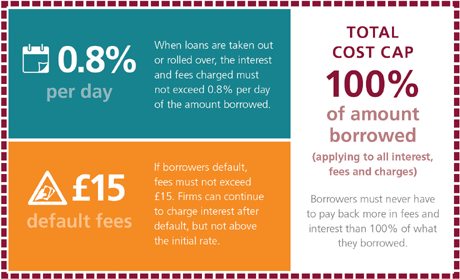In January 2015, we will introduce a cap on the total amount that high-cost short-term credit lenders can charge.
Our proposals for a price cap on high-cost short-term credit

The high-cost short-term credit industry (including payday loans) has grown rapidly in recent years, as many consumers look for quick and easy borrowing to manage their finances.
We began regulating these firms on 1 April 2014, with a strong commitment and clear remit to tackle poor conduct in the market and ensure that there is an appropriate degree of protection for consumers.
Why are we consulting on this?
In January 2015, we will introduce a cap on the total amount that high-cost short-term credit lenders can charge. We are doing this to meet a duty given to us by the Government to secure an appropriate degree of protection for borrowers against excessive charges in this market.
This consultation paper (CP) discusses our cap and the detailed research and analysis that we carried out to inform our proposals.
Who should read this?
Anyone who has taken out, is considering taking out or has been refused a high-cost short-term loan, or has had difficulties paying back such loans, may want to comment on our proposals for a price cap.
In particular, this paper will interest:
- FCA-authorised firms involved in HCSTC, as lenders, operators of peer-to-peer platforms or brokers (most of whom will have interim permission)
- firms that are considering applying for FCA authorisation to carry out these activities
- trade bodies representing consumer credit firms
- consumer organisations
- groups that represent those with protected characteristics (age, gender, disability, race, pregnancy and maternity, religion and belief, sexual orientation and transgender) as they may wish to comment on our equality impact assessment
What is our price cap?
Our cap ensures that consumers will never need to pay back more than twice what they have borrowed, and someone taking out a typical loan over 30 days and repaying on time will not pay more than £24 per £100 borrowed.
We looked at the potential impact of our price cap on firms and consumers, and we believe that it is proportionate and will benefit consumers.
We expect the cap to lead to a reduction in lending and some customers who have previously taken out high-cost short-term loans will no longer get them. However, we believe that, apart from for a short initial period, they will be better off without loans.
Initial cost cap
We tested a range of charges between 0.4% and 1% per day. A 0.8% cap per day lowers prices for borrowers who pay back their loans on time. This is calculated as a daily rate, which means the cost of the loan is directly proportionate to its duration.
Calculating the initial cost cap according to a percentage of the loan also means that pricing is proportionate to the size of the loan, so consumers only pay higher prices if they borrow more. This is fair for firms too, as the majority of their costs increase with the size of the loan. It also means they still have some flexibility to choose their own pricing structures.
Caps on default fee and default interest
It is reasonable not to prevent firms making a charge as they incur costs when a borrower fails to repay on time, so long as they are not excessive and they treat borrowers in default or arrears difficulties with forbearance and due consideration. We think that a £15 cap on default charges reflects the need to provide consumers with an incentive to pay back on time, whilst also providing the right incentive to firms by not rewarding failure to properly assess affordability.
Total cost cap
The total cost cap protects borrowers from escalating fees and charges on longer loans.
We tested a range of total caps from 50% to 200%. We believe 100% balances protecting consumers and allowing firms to continue offering loans for different lengths of time. Taking into account behavioural factors, we also think a 100% total cost cap would be easier for consumers to understand and help them to identify any lenders that charge them more.
Next steps
Our consultation on this paper is now closed. We are currently considering responses and plan to publish our final rules in early November, in preparation for the cap taking effect from 2 January 2015.
All consumer credit firms that were part of the OFT regime and now have ‘interim permission’ will have to apply for authorisation from 1 October 2014 onwards (HCSTC lenders from 1 December 2014). HCSTC firms will not be authorised if they cannot demonstrate that they are complying with the price cap and other new rules. We will proactively supervise to ensure ongoing compliance.
We will review the price cap in the next two years.
